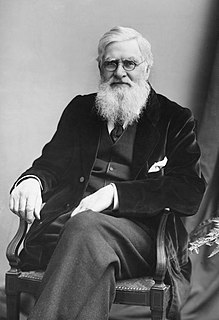A Quote by Noam Chomsky
If humans are organisms like every other organism - which they are - then we should expect that if there are some domains where real scientific progress is possible, then there are others where it is not.
Related Quotes
The real controversy comes with anthropologists - not all, but some - who see themselves as studying culture, and they then see culture from the perspective of humans, which is what they study. From their perspective, or, from some of their perspectives, it's sort of heresy to even talk about culture in any other animal. Others would say, "Yeah, you can talk about it, but our definitions of culture are so utterly different from yours and include things like values, and so on, which you've never shown to exist in any of these other creatures."
The very properties of the human mind that provide an enormous scope for human genius in some domains will serve as barriers to progress in other domains, just as the properties that enable each child to acquire a complex and highly articulated human language block the acquisition of other imaginable linguistic systems.
vivisection is not the same thing as scientific progress. There is such a thing as scientific progress. But this wholesale dedication of scientists to vivisection, which is the easy and cheap way, actually prevents them from scientific progress, for true progress is difficult and requires genius and imagination in its devoted workers.
There might have been a hundred or a thousand life-bearing planets, had the course of evolution of the universe been a little different, or there might have been none at all. They would probably add, that, as life and man have been produced, that shows that their production was possible; and therefore, if not now then at some other time, if not here then in some other planet of some other sun, we should be sure to have come into existence; or if not precisely the same as we are, then something a little better or a little worse.
Contrary to what I once thought, scientific progress did not consist simply in observing, in accurately formulating experimental facts and drawing up a theory from them. It began with the invention of a possible world, or a fragment thereof, which was then compared by experimentation with the real world. And it was this constant dialogue between imagination and experiment that allowed one to form an increasingly fine-grained conception of what is called reality.
The real question is whether we can learn anything from our experiences upon which we may grow and help others to grow in the likeness and image of God. We know that if we rebel against doing that which is reasonably possible for us, then we will be penalized. And we will be equally penalized if we presume in ourselves a perfection that simply is not there. Apparently, the course of relative humility and progress will have to lie somewhere between these extremes. In our slow progress away from rebellion, true perfection is doubtless several millennia away
There is part of a structure in which every species is related to every other species. And they're built up on species, like a pyramid. The simpler cell organisms, and then the more complicated ones, all the way up to the mammals and birds and so forth. We call it 'developing upward'... The whole thing depends on every part of it. And we're taking out the stones from the pyramid.
Objectivity is impossible and it is also undesirable. That is, if it were possible it would be undesirable, because if you have any kind of a social aim, if you think history should serve society in some way; should serve the progress of the human race; should serve justice in some way, then it requires that you make your selection on the basis of what you think will advance causes of humanity.



































